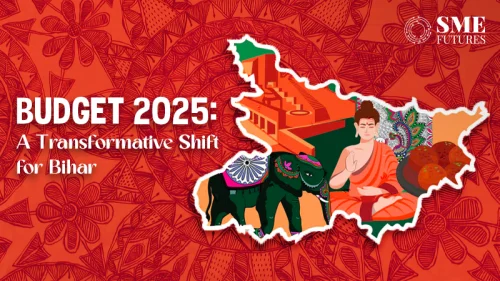The Indian space industry is experiencing a renaissance, fuelled by a dynamic ecosystem of start-ups and organisations that want to make a difference in this realm. In recent years, these space pioneers have been instrumental in reshaping the industry, driving innovation, and contributing to India’s growing presence in space exploration and commercial services.
The sector is experiencing a profound transformation, propelled by an all-new approach by its stakeholders. It is also witnessing collaborations among start-ups, established players, and government organisations. This transformation is reshaping not only the Indian space sector but is also contributing to global advancements in space technology.

Cost-effective satellite launches and small satellite technology
One of the cornerstones of the Indian space industry’s transformation is the adoption of cost-effective satellite launches and the proliferation of small satellite technology. Start-ups like Astrome and SpaceFields are at the forefront of these developments.
“Cost-effective satellite launches and small satellite technology are pivotal for India’s space ambitions,” points out Neha Satak, CEO & Co-Founder, Astrome Technologies.

Cost-effective satellite launches significantly reduce the financial burden of placing payloads into orbit. This affordability empowers India to explore space more extensively, including lunar and planetary missions, at a fraction of the traditional costs. Furthermore, small satellite technology, characterised by flexibility and lower development expenses, allows for the rapid deployment of satellite constellations.
These constellations have transformative implications for earth observation, remote sensing, telecommunications, and IoT services. Apurwa Masook, Founder & CEO of SpaceFields, states, “Companies and organisations of all sizes are increasingly able to experiment with new ways of providing services in space.”
“Cost-effective satellite launches reduce the financial burden and risk of space missions, making them more accessible and affordable for various stakeholders, such as government agencies, private companies, academic institutions, and even foreign customers. India has developed low-cost launch vehicles, that have brought down the launch costs of these small satellites,” says Debadatta Mishra, Co-founder and COO, Erisha Space.
Leveraging space-based applications for global challenges
“Indian start-ups are tapping space-based applications to tackle global challenges and offer innovative solutions across diverse sectors,” underlines Satak. These start-ups leverage satellite data and technology to address issues ranging from agriculture and disaster management to telecommunications and environmental monitoring.
In agriculture, for instance, remote sensing data is used to monitor crop health, optimise irrigation, and predict crop yields, thereby enhancing food security. Real-time satellite imagery aids in assessing and responding to natural disasters promptly, minimising human and economic losses in the realm of disaster management. Moreover, telecommunications start-ups use satellite technology to extend connectivity to remote and underserved areas, bridging the digital divide.
Astrome’s ground terminal solution, GigaSat, plays a crucial role in extending connectivity to remote areas through seamless satellite communication.
Future innovations and global contributions

With a rich talent pool and growing investment support, Indian start-ups are well-positioned to excel in satellite technology, earth observation, and space exploration.
They can pioneer cutting-edge solutions for communication, remote sensing, data analytics, and space situational awareness, fuelling advancements in agriculture, disaster management, and environmental monitoring. Moreover, as commercial space exploration gains momentum, Indian start-ups can play a huge role in launching and maintaining small satellites, enabling affordable access to space and supporting global scientific research and commercial ventures.
“India’s space start-up ecosystem holds immense potential for driving future innovations and making substantial contributions to global space endeavours,” says Satak.
Collaborations between start-ups and established space organisations are poised to expand, fostering knowledge sharing and technological advancements. As this ecosystem flourishes, India’s space start-ups will be pivotal in shaping the future of space technology and exploration on a global scale.
Space Fields is also involved in making rocket propulsion systems for the defence industry. Masook talks about two global phenomena that he has been looking into which he thinks will be the next big thing to cash in on.
“Indubitably, there are two global phenomena that we are observing. The rapidly increasing number of orbital launches, as well as the continued spending towards military modernisation efforts. Geopolitically, India is uniquely positioned as a friendly country to capitalise on both of these emerging trends, with a continued thrust on indigenisation. Hence, we strongly feel that the value proposition of building a core supply and innovation arm for the defence & space industries is deep,” contends Masook.
Masook further adds, “We are going inch-wide and mile-deep into rocket propulsion, a core specialisation with diverse use cases in many industries. Globally, legacy players have been scrambling to get into the factory queue of reliable solid propellant production. Hence, we see a big whitespace that calls for integral dual-use solution technologies that are critical for serving both commercial and strategic needs.”
The space business
“With a target to contribute 2 per cent to India’s envisaged $5 trillion GDP, India is eying at least a 10% share in this upcoming trillion-dollar space industry. Of the total 180 successful orbital launches globally in 2022, over 75 were from the US (from 6 launch sites) and over 60 were from China (from 6 launch sites). India only had 4 (from one launch site, Sriharikota). This indicates significant room for growth and overall business potential in the sector,” says Masook.
The government aims to support a robust space ecosystem with dual-use capabilities, as space assets hold strategic importance and have potential applications in aerospace and defence markets.
India’s space sector has the capacity to achieve a substantial industry worth between $40 billion and $100 billion by 2040, propelled by a growing space budget, a surge in launch services, the participation of private entities and start-ups, and the emergence of the satellite internet market. Presently, India’s space industry is estimated at $8 billion, representing a 2 per cent share within the global space economy.
Space technology for a connected world
There are many start-ups which are using technology to bring the world closer and enhance global connectivity.
Satellite technology is increasingly being seen as a transformative force with far-reaching benefits, not limited to a single region. Astrome is one such company and it has introduced cutting-edge products like Gigamesh and Gigasat to make high-speed broadband internet more accessible, particularly in remote and underserved areas.
These innovative solutions play a crucial role in bridging the digital divide and connecting remote communities to the global digital landscape, even in challenging terrains. Gigamesh extends the reach of broadband networks to previously unreached areas, while Gigasat provides satellite-based internet connectivity, ensuring reliable access to the internet in the most remote regions. Together, these solutions break down the digital divide, foster education, economic development, and an improved quality of life.
Improved access to high-speed internet and enhanced connectivity empowers individuals and communities, fostering innovation, expanding opportunities, and ultimately contributing to a better quality of life worldwide.
Space situational awareness for a crowded sky
The proliferation of satellites in orbit poses significant challenges for the long-term sustainability of space activities. With thousands of satellites and space debris, the need for space situational awareness (SSA) has never been greater.

Digantara, led by CEO and Founder, Anirudh Sharma, is addressing this challenge by providing comprehensive and actionable intelligence for sustainable and safer space operations. Their platform, Space-MAP, aims to be as powerful and sophisticated as Google Maps, but for space, serving as a foundational layer for space operations and astrodynamics research.
“By deploying a constellation of SCOT-enabled satellites, we intend to detect and track objects at higher resolutions than the current industry standards, contributing to the most comprehensive catalogue of the near-earth environment and objects,” Sharma points out.

Space debris in orbit is a critical problem because it threatens operational satellites and spacecraft. It needs to be tackled by active debris removal, responsible satellite practices, and global cooperation.
“Once completely deployed and services enabled, we will be able to offer services to users across the value chain, and through the complete lifecycle of a spacecraft mission ranging from Mission Planning to Mission Operations to End-of-Life de-orbiting, thus building value on the untracked objects,” says Sharma.
Geospatial data for informed decision-making
Various start-ups are playing a pivotal role in supporting critical sectors through large-scale cartographic and topographic mapping. Companies as such have expertise in environmental studies that contributes to sustainable land management.
Debadatta leads Erisha Space, and his core focus is on utilising remote sensing data. Erisha is working on leveraging high-resolution remote sensing data from various sources to provide comprehensive analytical solutions. Numerous companies in India are actively pursuing advancements in geospatial technology to gain a competitive edge.
“We use high-resolution data sets which enable accurate representations of various industries, including oil and gas, national highways, and railway infrastructure. These accurate representations are instrumental in efficient resource utilisation and informed decision-making, ensuring the sustainability of these critical sectors,” Mishra asserts.
Pataa is another company that is working on leveraging geospatial data to provide a better navigation system to users. Navigation in India can get complicated due to the problem of multiple alleyways that even Google Maps fails to register.
Forward in this space

The Indian space industry is experiencing a transformative journey driven by innovation, cost-effective solutions, and the collaborations between start-ups and established players. These efforts are not only reshaping India’s space sector but are also positioning it to make substantial contributions to global space endeavours.
From cost-effective satellite launches to space situational awareness, and from high-speed internet access to geospatial data analytics, Indian space start-ups are at the forefront of pioneering solutions for global challenges and commercial applications. As this ecosystem continues to flourish, India’s space industry will play a pivotal role in shaping the future of space technology and exploration on a global scale, fostering connectivity, sustainability, and innovation in the space industry.
The Indian space industry is on the cusp of a new era, and with visionary leaders and innovative start-ups, the future of space technology looks brighter than ever.











